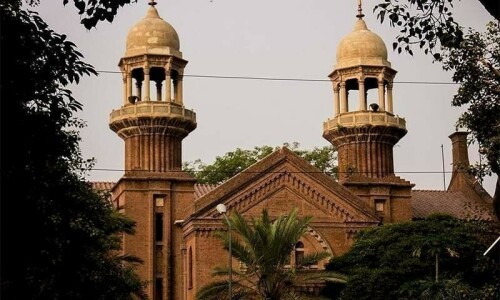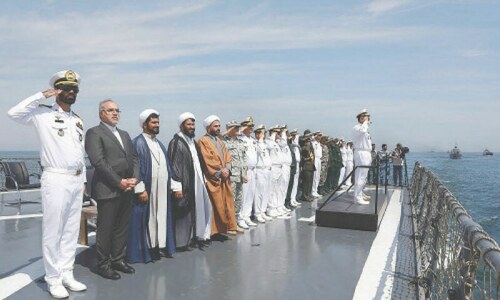THE attack on the Pakistan embassy in Kabul last week raises questions about the Taliban administration’s capacity and resolve to fight terrorist groups operating from Afghan soil. The shooting that targeted the chargé d’affaires seems to be an extension of the militants’ war on the Pakistani state.
Although the Islamic State-Khorasan (IS-K) has reportedly claimed responsibility for the assault, the identity of the attackers remains unverified. In a statement posted on social media, the group confirmed that the Pakistani envoy was the target.
A spokesman for the Afghan Taliban administration said the attacker was a citizen of a foreign country and an IS-K member. “Some foreign malicious circles are behind the attack and the aim was to create distrust between the two brotherly countries,” the statement said.
But the Taliban officials have not identified the nationality of the perpetrator. The attack was well planned. The assailant seemed well armed and well trained. While the Pakistani envoy narrowly escaped, a Pakistani security official sustained grave injuries. It was a serious security breach as the attacker managed to enter the embassy premises. The incident highlights the deteriorating security situation in Afghanistan.
In another incident the same day, unidentified militants detonated a car bomb and tried to storm the headquarters of Hezb-i-Islami, headed by Gulbuddin Hekmatyar, in the Afghan capital. The former Afghan prime minister was unhurt. It is not clear whether the two incidents were linked.
The attack on the Pakistan embassy has given a dangerous twist to the terrorist threat from Afghanistan.
Curiously, the assault on the Pakistani embassy came with the TTP’s calling off a tenuous ceasefire with Pakistan. The outlawed militant group based in Afghanistan has intensified its terrorist actions in Pakistan’s former tribal regions since then.
There has also been a marked escalation in cross-border attacks on Pakistani security forces. The return of the conservative Islamic regime in Afghanistan has emboldened Pakistani militant groups taking shelter in that country.
Predictably, the so-called peace negotiations that the Afghan Taliban facilitated have collapsed, with the TTP refusing to lay down their arms. Instead, the group had presented its own conditions that virtually call for a surrender of Pakistan’s control over the former tribal regions.
It is evident that the Afghan Taliban administration seeks to use the TTP as leverage to put pressure on Pakistan. Besides, it is also apparent that some factions of the TTP are part of the transnational militant group whose origins lie in the Middle East.
The two cannot be separated. It seems that the Taliban officials deliberately want to focus on the Islamic State, sparing the TTP that continues to enjoy the administration’s support.
It may be true that the Taliban are serious about fighting the Islamic State but refuse to recognise the close connection between the TTP and IS-K. It is well known that many IS-K fighters have come from the ranks of the TTP.
Also, some other foreign militant groups with sanctuaries in Afghanistan, such as the Islamic Movement of Uzbekistan (IMU), have forged alliances under the IS banner.
It is well known that the first chief of the Islamic State in Afghanistan, Hafiz Saeed, was a former commander of the TTP who had fled to Afghanistan after the militants were driven out of the former tribal regions by the military operation.
The Pakistani militant group formed the nucleus of the IS when it emerged on the scene in Afghanistan in 2015. The group has been operating mostly in eastern Afghanistan where the TTP has taken refuge.
After having been driven out of North Waziristan, IMU fighters moved to northern Afghanistan expanding IS operations, which also caused serious concern to neighbouring Iran and the Central Asian states. The emergence of the IS-K presented a significant challenge to the Afghan Taliban then fighting the US-led forces.
There had not been any major defections to the IS from their ranks, but the very existence of the transnational militant group threatened Afghan Taliban control. Curiously, there has been a marked increase in IS terrorist attacks after the return of Taliban rule.
According to an official American report, the ranks of the IS-K have swelled exponentially since August last year, bringing the estimated number of fighters to 4,000.
Most IS attacks have targeted the minority Shia community. The growing strength of transnational militant groups and foreign fighters gaining space in the country, present a serious security threat not only to Afghanistan but also to neighbouring countries, mainly Pakistan.
A major reason for the resurgence of the terrorist networks are the ideological linkages the Afghan Taliban have had with foreign militant groups like the TTP and IMU. Their connection with transnational terrorist outfits is evident.
The Afghan Taliban’s support for global terrorists casts huge doubts over their commitment to the international community to not allow any terrorist group to use Afghan soil for its activities.
According to a recent UN Security Council report, “Terrorist groups enjoy greater freedom in Afghanistan than at any time in recent history.” The TTP is certainly the most lethal of them with its close ties to Al Qaeda and IS-K.
Meanwhile, the latest attack on the Pakistan embassy has given a new and dangerous twist to the terrorist threat emanating from Afghanistan.
Such incidents could further strain relations between Islamabad and Kabul. The increasing number of incidents of cross-border attacks and the Afghan Taliban administration’s refusal to take action against the TTP has already affected relations between the two.
Interestedly, the firing on the Pakistani embassy took place within days of the visit to Kabul of Hina Rabbani Khar, Pakistan’s minister of state for foreign affairs.
This was the first official-level contact between the two countries in months. Besides other issues, the Taliban administration’s failure to act against the TTP operating from Afghan territory has also been taken up in meetings between the two sides.
The daring attack on the embassy has exacerbated an already perilous environment, endangering the lives of Pakistani officials based in Kabul and other Afghan cities. It is imperative that the Afghan Taliban cut off all ties with the TTP and other transnational militant networks if they are sincere about meeting their commitments to the international community.
The writer is an author and journalist.
Twitter: @hidhussain
Published in Dawn, December 7th, 2022
















































